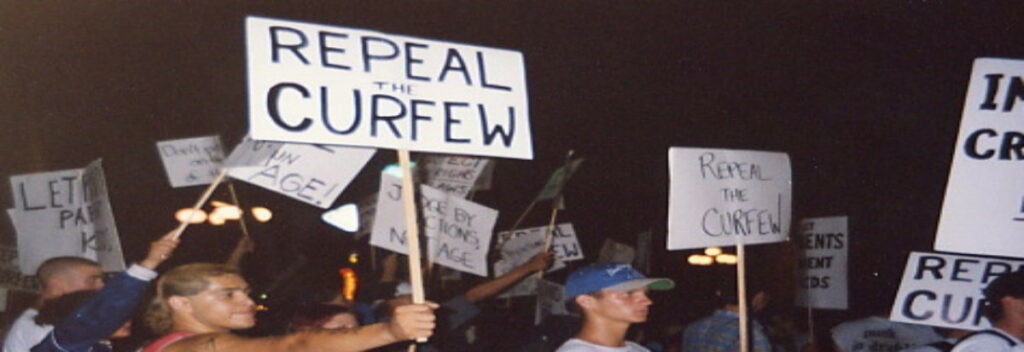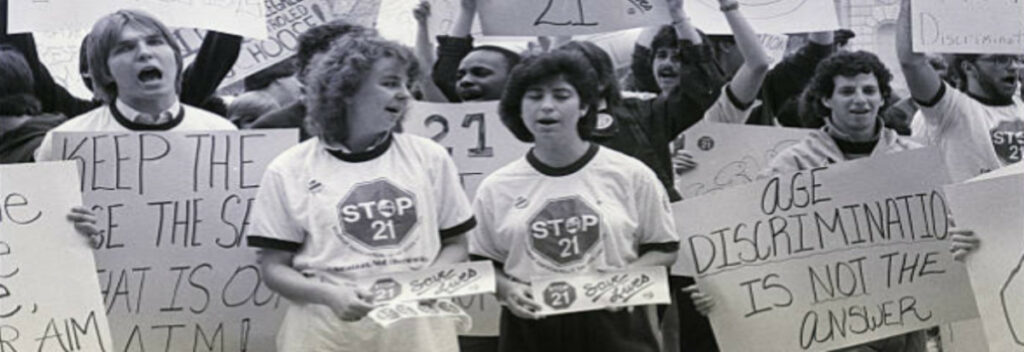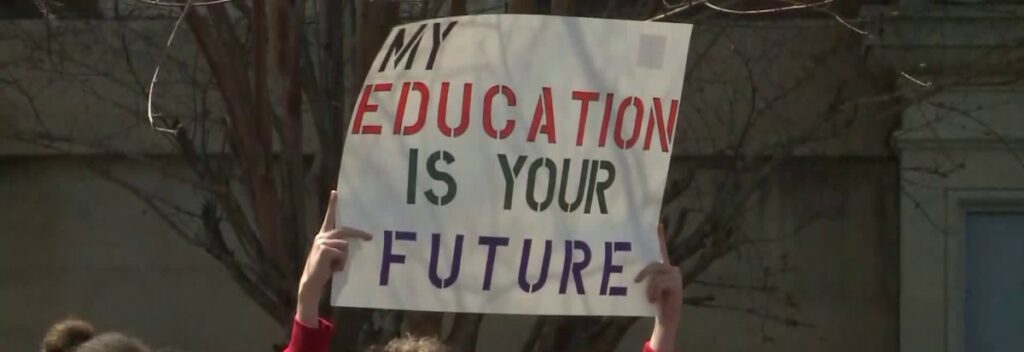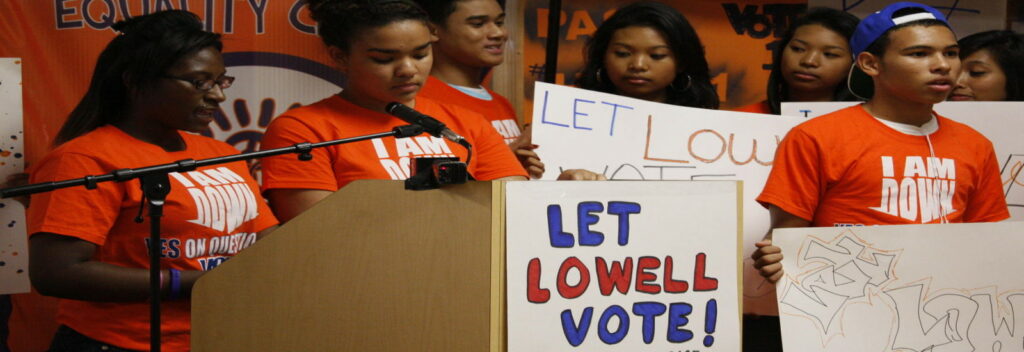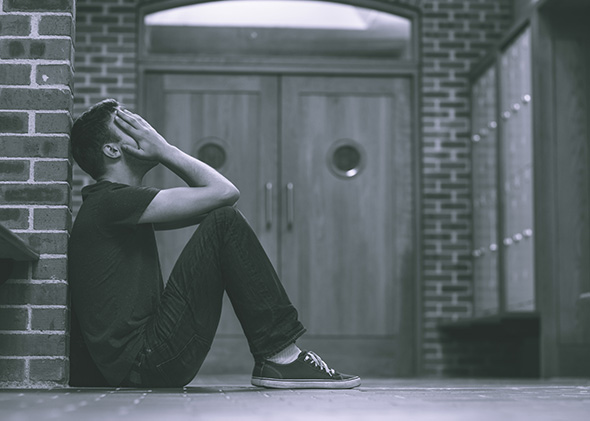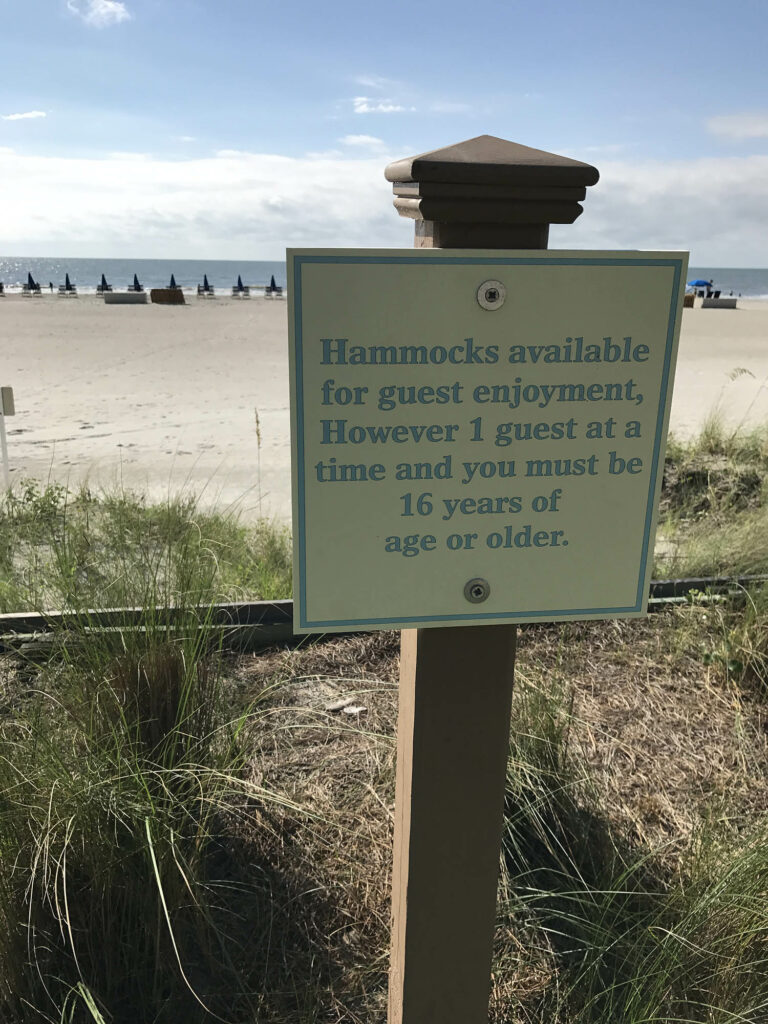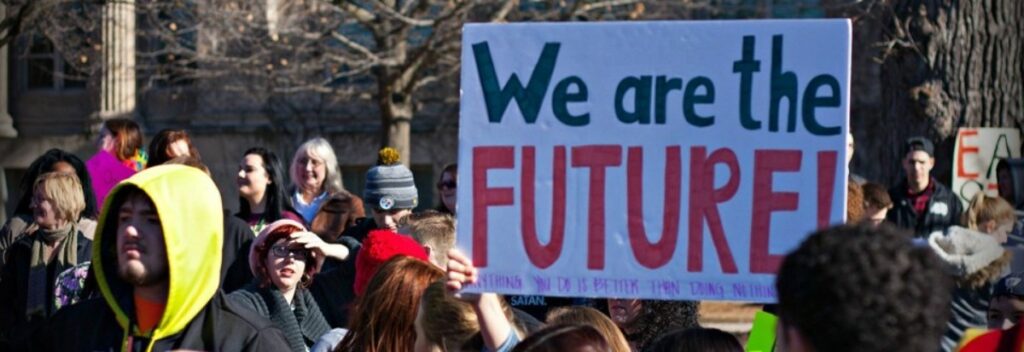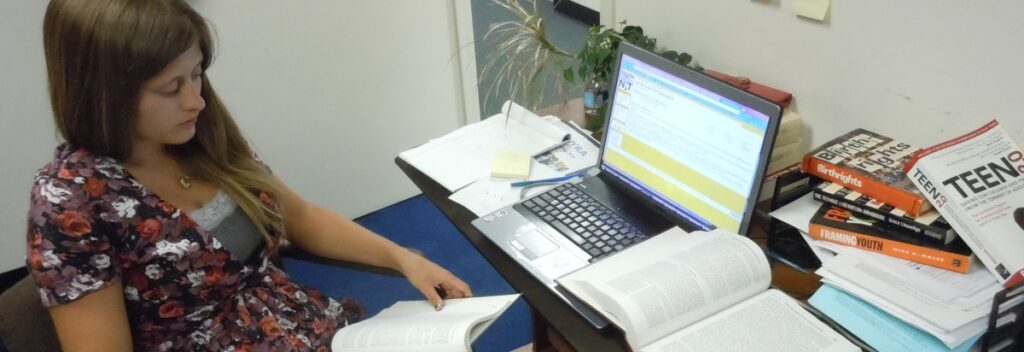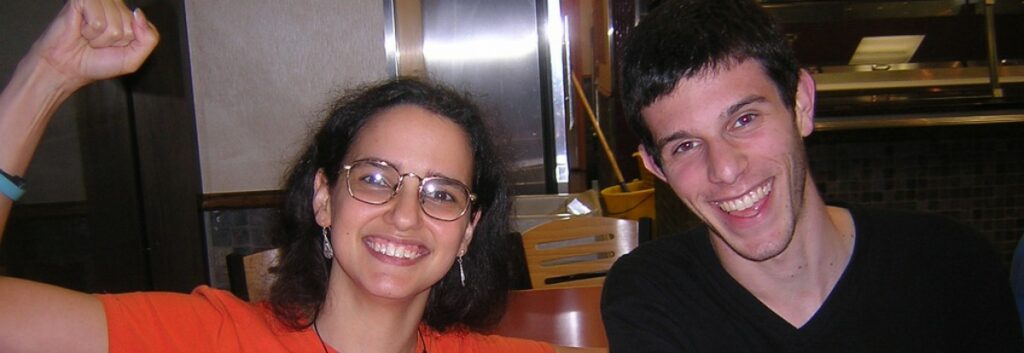Youth rights are the rights that everyone should have, but that are denied to some of us because of our young age. These rights include the right to be full participants in our representative democracy through voting, the right to privacy, the right to be free from physical punishment, the right to make decisions about our own lives, the right to be outdoors, the right to prove ourselves, and the right to receive the same amount of respect as anyone else. These rights and many others, however, are denied to us because of ageism.
Ageism, just like racism or sexism, is a form of discrimination and prejudice. But unlike discrimination based on race, gender, religion, sexual orientation, ability, or age (at least for older people), ageism against the young (sometimes called adultism) is both legal and common. Ageism impacts young people on a daily basis, sometimes overtly through legal age restrictions, but also invisibly through negative attitudes, beliefs, biases, preconceptions and stereotypes about youth. It strips young people of any social, economic and political power and leaves us vulnerable to abuse.
Young people are denied basic human and civil rights.
Ageism prevents young people from enjoying many rights that are considered universal or inalienable, such as those in the U.S. Declaration of Independence, the U.S. Bill of Rights, and the U.N. Universal Declaration of Human Rights. Young people experience far greater restrictions on:
- The right to vote and participate in politics
- Freedom of speech, both at school and off-campus
- Freedom of assembly
- Protections against cruel and unusual punishment, including corporal punishment
- The right to bodily integrity, including the right to consent to or refuse medical treatment.
- Protection against unreasonable search and seizure
- The right to due process before being deprived of liberty or property
- Equal protection before the law, which protects older people from age discrimination, but not younger people
- The right to make decisions concerning education
- The right to work and earn money
Even after reaching what is considered the legal age of adulthood, we can be denied service from a variety of businesses, including bars and restaurants, music venues, hotels, and car rentals. In most states, and at the federal level, we are prevented from holding certain elected positions until we are 30 or above. These are unmistakable violations of young people’s civil rights.
Young people are at the mercy of parents and older people.
The government not only denies basic human and civil rights to young people, it also gives a significant amount of power to parents. As long as they aren’t overtly abusive, parents are legally permitted to control every aspect of their children’s lives. This includes where we live, who our friends are, what clothes we wear, and where we go to school. Parents can physically discipline us, confine us in our rooms or homes, confiscate our property, and control our communication and social activity.
And thanks to a doctrine called “in loco parentis,” this power that parents have over young people is extended to teachers and school administrators. Both at school and at home, we are told what to wear, what to learn, and when to go to the bathroom. We can be hit or shamed or have our property confiscated. In fact, according to a study conducted by psychologist Robert Epstein, we have fewer freedoms than an active duty soldier or a prison inmate.
While the intentions of most parents are good, whenever someone has that much control over another person and can isolate them from others, the likelihood of abuse increases.
- In 2015, Child Protective Services investigated over 4 million potential victims of abuse where the alleged perpetrator was in a position of authority.
- Over ninety percent of cases of sexual abuse against people under 18 are committed by parents or someone in a similar role.
- Tens of thousands of teens are sent to abusive behavior modification camps by their families every year.
The government at all levels not only allows a dangerous level of control over young people, but actively denies us basic legal recourse against abuse. It’s highly difficult for young people to escape abusive households or access the court system. The only mechanism for addressing abusive behavior by a family member is to go into the foster care system, where we are forced to give up our homes, belongings, schools, and friends. This is why, even when young people do have legal recourse, most of us tend to tolerate this treatment.
Young people are held to a double standard of behavior.
Young people get punished for doing things that are perfectly acceptable for older people. And when we make mistakes, they are not seen as being just a part of life, but as an indicator of “irrational behavior” and used as a reason for more control and punishment.
- We are held to higher standards of behavior. Even basic rules of etiquette like “don’t be rude” are applied more strictly to young people than to older people. When older people are rude—for example, by contradicting someone—society considers this to be normal and acceptable. Meanwhile, when young people contradict someone, society punishes us for “talking back.” In other instances, young people are labeled as immature or “out of control” for behavior that is perfectly acceptable if you’re older, such as getting a tattoo, staying up all night, or disagreeing with the politics or religious beliefs of our parents.
- We are more easily targeted by the justice system. Young people are arrested and incarcerated for things that are considered normal, legal behavior for others. These status offenses make it a crime to drink a can of beer, buy a pack of cigarettes, stay home from school, go outside during curfew hours, and leave home. Even ordinary conflicts in school can become a criminal matter. Participating in such normal life activities can introduce youth into the criminal justice system, a system that some people are never able to escape.
- We suffer harsher punishments. Many punishments that are considered too cruel and humiliating for if you’re older are nevertheless practiced every day on young people. These punishments include corporal punishment, public shaming, and the casual confiscation of property.
- We are less likely to be seen as individuals. Young people are unfairly lumped together in a way that older people are not. Whenever a young person does something wrong, society tends to blame “kids these days.” But whenever an older person does something wrong, society tends to blame only that individual and not “adults these days.” For example, people of all ages do odd and self-destructive things all the time, but it is never seen as part of a larger trend. However, one or two isolated cases of young people doing odd and self-destructive things are enough for the media to tell everyone that there is a “dangerous trend” among young people, when in fact almost no one is doing it.
- Our desire for independence is treated like a mental disorder. According to the manual used for classifying mental disorders, symptoms that suggest a need for treatment include: arguing with adults and other authority figures; refusing to comply with adults’ rules; staying out at night against parents’ wishes; running away; truancy; frequently getting out of our seats; and failing to complete homework or chores. While doing some of these things might also be unacceptable for older people in certain circumstances, young people are more likely to be told that these behaviors are a sign of a disorder and that medication is necessary in order to comply with these expectations.
- Our behavior is defined from an adult point of view. When there’s a difference between what is seen as typical adult behavior and youthful behavior, the qualities of young people tend to be viewed as defects, whereas those of older people tend to be viewed as normal. For example, young people get labeled as “moody,” instead of older people being labeled as “apathetic.” Young people are labeled as “risk-takers” instead of older people being labeled as “afraid to take risks.” While neither tendency is objectively superior to the other, older people hold up their own behavior as the standard by which all other behavior should be judged.
Young people are subject to false negative stereotypes.
Young people face negative stereotyping in the media, as well as in everyday life. However, stereotypes about young people are often hard to pin down because they contradict each other. Doing the exact opposite of what one stereotype says simply means we’ll be proving another. We’re trapped in a “damned if you do, damned if you don’t” situation. For example, we’re accused of being both:
- “Easily manipulated” but also “stubborn and rebellious.”
- “Violent and criminal,” but also “innocent and fragile.”
- “Angsty” but also “frivolous.”
- “Too emotional,” but also “apathetic and jaded.”
- “Too idealistic,” but also “unambitious.”
- “Lazy” but also “hyperactive.”
- “Stupid” but also “full of wisecracks.”
- “Unable to resist peer pressure,” but also “trying to be different just to be different.”
Like racial, ethnic, gender, and other stereotypes, stereotypes about youth might describe certain individuals, but they certainly don’t (and with the contradictions, can’t) describe us all. But their existence does demean us all, and when they inform the way we are treated and the laws we live under, they directly harm us.
Young people are treated as incapable, even when quite capable.
Society assumes that young people are incapable of taking on most responsibilities, making good decisions and contributing to society in a meaningful way.
However, millions of young people are employed and volunteer in the community. Many young people also have what are seen as “adult” responsibilities, such as being the primary caregiver for an ailing family member, and running a business. People under age 18 have the ability to win a Nobel Prize, reach the summit of Mount Everest, conduct cancer research, become published authors, teach a graduate-level course in nuclear physics, run a school, work for NASA, and risk their lives to save others. Examples of accomplished young people can be found throughout history as well as today. It is especially impressive that young people accomplish these feats in the face of limitations placed on us by society because of our age.
Even “average” young people are far more capable than society thinks. One study found that the average person aged 11-13 has a level of understanding, reasoning ability, and appreciation, that is within the normal range for people over 18. Another study estimated that approximately 30% of people aged 13-17 have reached a higher level of what is considered “adultness” than the average person aged 18 and older. Of course, even if young people were incapable in certain ways, this would not justify denying basic human and civil rights. We do not need to be educated to have full protection under the law, or the right to vote, or fair opportunities.
Young people are segregated from older society.
While other forms of segregation are unacceptable, age-related segregation of youth is alive and well. Society highly discourages young people from interacting with anyone who is not our own age, except for authority figures in an unequal relationship. This is enforced by an extensive system of laws and customs:
- Most young people are required to attend school for most of the day, where we are cut off from the rest of the world. It also segregates students further by age, so that older and younger students have few opportunities to interact.
- Youth curfews make it illegal for young people to be outside during certain times, forcing us out of our communities. Many activities take place during curfew (some of which operate during the day or evening) that young people are excluded from.
- Many businesses do not allow young people to set foot on the premises. Examples vary from bars and restaurants, to concert venues, pool tables, malls, stores, movie theaters, hammocks, events and festivals.
- Young people are barred from the working world. Although labor laws claim to protect young people from exploitation by older people, they push young people into the background of the labor force, and often ignore our desire and even our need to work.
- Segregation takes place in the home. Sometimes young people are pushed into a separate area: a “kids’ table” or a separate room that we are not supposed to leave. Often young people are kept from participating in conversations through being shushed, talked over, or simply ignored.
Many young people also value this separation, as we seek to find space where we aren’t constantly monitored and evaluated. However, we recognize that this segregation prevents people of different ages from understanding one another. Both young and older people end up feeling distrustful and resentful towards one another.
At NYRA, we work to challenge ageism in the hope that all young people will be granted the rights that everyone deserves.





